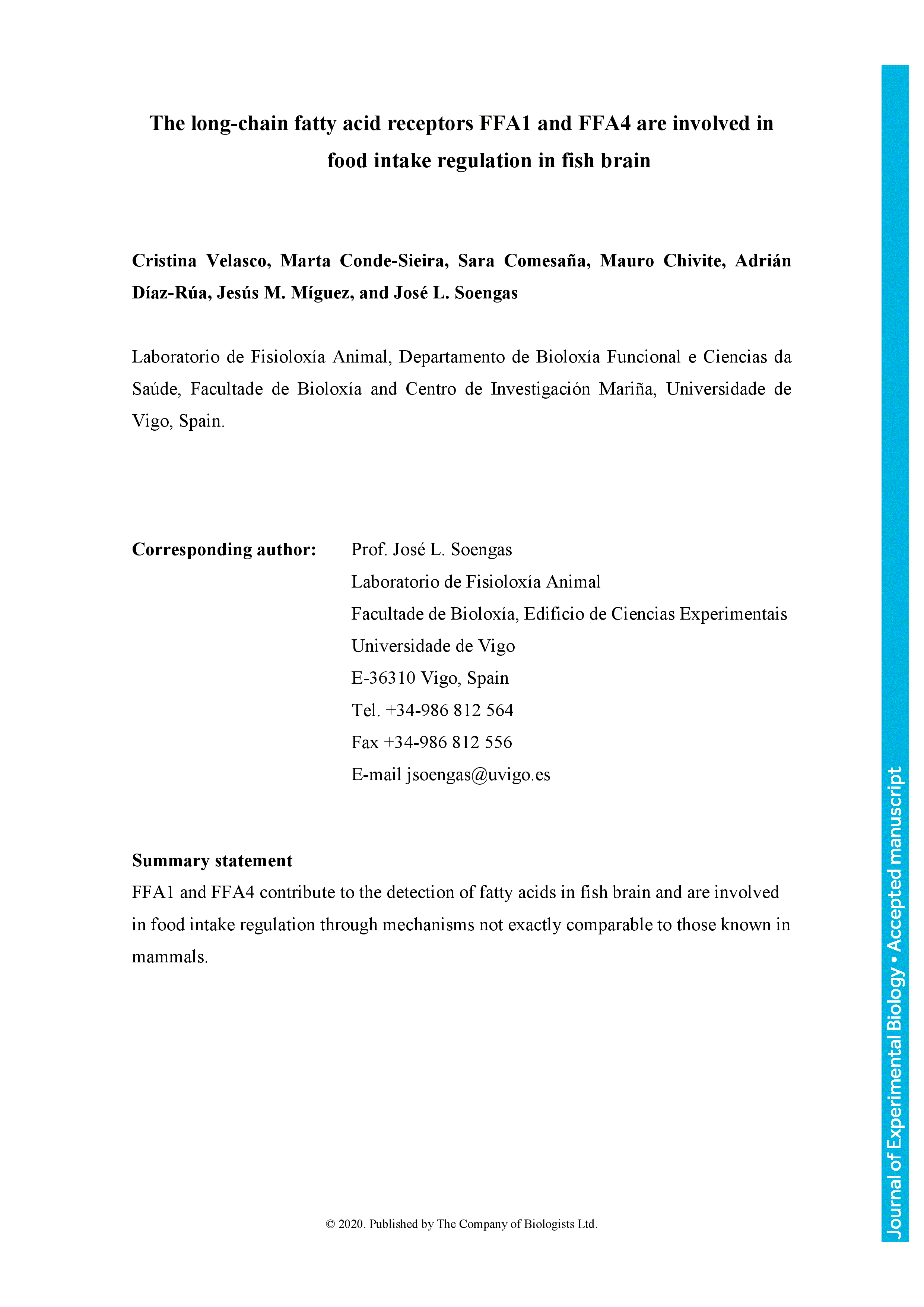We hypothesized that the free fatty acid receptors FFA1 and FFA4 might be involved in the anorectic response observed in fish after rising levels of long-chain fatty acid (LCFA) like oleate. Therefore, in a first experiment we demonstrated that intracerebroventricular (ICV) treatment of rainbow trout with FFA1 and FFA4 agonists elicited an anorectic response 2, 6, and 24h after treatment. In a second experiment, the same ICV treatment resulted after 2h in an enhancement in the mRNA abundance of anorexigenic neuropeptides pomca1 and cartpt and a decrease in the values of orexigenic peptides npy and agrp1. These changes occurred in parallel to those observed in the mRNA abundance and/or protein levels of the transcription factors Creb, Bsx and Foxo1, protein levels and phosphorylation status of Ampkα and Akt, and mRNA abundance of plcb1 and itrp3. Finally, we assessed in a third experiment the response of all these parameters after 2h of ICV treatment with oleate (the endogenous ligand of both FFARs) alone or in the presence of FFA1 and FFA4 antagonist. Most effects of oleate disappeared in the presence of FFA1 and FFA4 antagonist. The evidence obtained support the involvement of FFA1 and FFA4 in fatty acid sensing in fish brain, and thus being involved in food intake regulation through mechanisms not exactly comparable (differential response of neuropeptides and cellular signalling) to those known in mammals.
The long-chain fatty acid receptors FFA1 and FFA4 are involved in food intake regulation in fish brain
Currently Viewing Accepted Manuscript - Newer Version Available
- Split-screen
- Views Icon Views
- Open the PDF for in another window
-
Article Versions Icon
Versions
- Version of Record 03 September 2020
- Accepted Manuscript 01 January 2020
- Share Icon Share
-
Tools Icon
Tools
- Search Site
Cristina Velasco, Marta Conde-Sieira, Sara Comesaña, Mauro Chivite, Adrián Díaz-Rúa, Jesús M. Míguez, José L. Soengas; The long-chain fatty acid receptors FFA1 and FFA4 are involved in food intake regulation in fish brain. J Exp Biol 2020; jeb.227330. doi: https://doi.org/10.1242/jeb.227330
Download citation file:
Advertisement
2023 JEB Outstanding Paper Prize shortlist and winner

The JEB Editors are delighted to announce the shortlisted authors for the 2023 JEB Outstanding Paper Prize. Read the winning paper - Tiny spies: mosquito antennae are sensitive sensors for eavesdropping on frog calls - by Hoover Pantoja-Sanchez and Brian Leavell from Ximena Bernal's lab at Purdue University, USA.
JEB Science Communication Workshop for ECRs

If you’re an early-career researcher interested in science communication and are attending the SEB Annual Conference in Prague this summer, come a day early and join the JEB Editors at a sci comm workshop to learn the key writing skills needed to promote your research to a broad audience beyond your peers (1 July at 14.30-17.30). Places are limited to 24 attendees, and applicants should apply through the SEB registration page by 30 April 2024.
Bridging the gap between controlled conditions and natural habitats in understanding behaviour

Novel technologies enable behavioural experiments with non-model species, in naturalistic habitats and with underexplored behaviours. In their Commentary, Scholz and colleagues discuss how to obtain a deeper understanding of the natural ecology and lifestyle of study animals.
How a macrourid fish remains buoyant at depths it should be unable to reach

Fish with swimbladders should not be capable of descending below 7200m, but when Alan Jamieson and Todd Bond spotted a macrourid fish at 7259m, they knew they had seen something miraculous. Working with Imantes Priede, they reveal that the swimbladder of a 1 kg fish could hold 37.9 g of oxygen, sufficient to offset the weight of the fish's bones, and take 221-440 days to fill, which is plausible because it takes years for the fish to descend to such depths.
ECR Workshop on Positive Peer Review

Are you an ECR looking for tips on how to write concise, astute and useful manuscript reviews? If so, join the JEB Editors at a 2-hour JEB-sponsored Workshop on Positive Peer Review at the Canadian Society of Zoologists annual meeting in Moncton on 9 May 2024 at 13.00-15.00. There are 25 spaces for ECRs and selection is first come, first serve. To sign up, check the ECR Workshop box when you register for the CSZ meeting.



